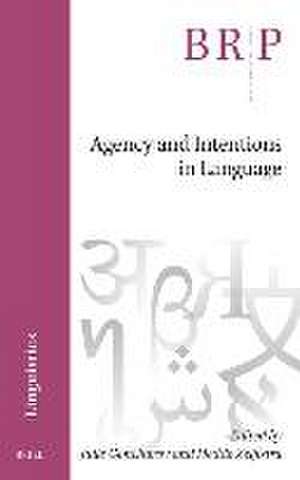Agency and Intentions in Language: Brill Research Perspectives in Humanities and Social Sciences / Brill Research Perspectives in Linguistics, cartea 6
Julie Goncharov, Hedde Zeijlstraen Limba Engleză Paperback – 5 iun 2023
Preț: 231.18 lei
Nou
Puncte Express: 347
Preț estimativ în valută:
44.24€ • 47.30$ • 36.88£
44.24€ • 47.30$ • 36.88£
Carte indisponibilă temporar
Doresc să fiu notificat când acest titlu va fi disponibil:
Se trimite...
Preluare comenzi: 021 569.72.76
Specificații
ISBN-13: 9789004679788
ISBN-10: 9004679782
Pagini: 110
Dimensiuni: 155 x 235 mm
Greutate: 0 kg
Editura: Brill
Colecția Brill
Seria Brill Research Perspectives in Humanities and Social Sciences / Brill Research Perspectives in Linguistics
ISBN-10: 9004679782
Pagini: 110
Dimensiuni: 155 x 235 mm
Greutate: 0 kg
Editura: Brill
Colecția Brill
Seria Brill Research Perspectives in Humanities and Social Sciences / Brill Research Perspectives in Linguistics
Notă biografică
Julie Goncharov is a post-doctoral researcher at the Seminar for English Philology and the University Center for Text Structures at the Georg-August-University in Göttingen. Her main areas of interest are semantics/pragmatics of natural languages and philosophy of language. Her current projects revolve around questions concerning agency, intentions, free will and their representations in language.
Hedde Zeijlstra is Professor at the Seminar for English Philology at the Georg-August-University in Göttingen. His main interest is the relation between sentence meaning and form: how does the meaning of a sentence follow from its parts, and why are there so many different ways of expressing the same meaning across languages?
Hedde Zeijlstra is Professor at the Seminar for English Philology at the Georg-August-University in Göttingen. His main interest is the relation between sentence meaning and form: how does the meaning of a sentence follow from its parts, and why are there so many different ways of expressing the same meaning across languages?
Cuprins
Preface
Notes on Contributors
Agency in the English Way-Construction’s Constraints
Caterina Cacioli
Abstract
Keywords
1 Introduction
2 The Way-Construction
3 Attributing Agency
4 Corpus Research and Analysis
5 Conclusions
On Some Epistemic Access Effects
Francesco Costantini
Abstract
Keywords
1 Introduction
2 Subjunctive Obviation
3 Obviation and de se Attitude Reports
4 Epistemic Access as Source of Obviation
5 Other Expected Outcomes
6 Alternative Analyses
7 Concluding Remarks
Two Semantic Paths to Unintentional Causation
Ömer Demirok
Abstract
Keywords
1 Introduction
2 Background on Un-agentive Constructions
3 Syntactic Contrasts
4 Interpretational Contrasts
5 Summary of the Claims and Remaining Questions
Letting Structure Speak with Authority: Constraining Agents’ Choices with French laisser
Marta Donazzan, Clémentine Raffy, Bridget Copley and Klaus von Heusinger
Abstract
Keywords
1 Introduction
2 Theoretical Background
3 Characterising Authority as a Constraint on Choice
4 When Syntax Matters: Structural Constraints on Authority Relations
5 Conclusions
Acknowledgements
Index
Notes on Contributors
Agency in the English Way-Construction’s Constraints
Caterina Cacioli
Abstract
Keywords
1 Introduction
2 The Way-Construction
3 Attributing Agency
4 Corpus Research and Analysis
5 Conclusions
On Some Epistemic Access Effects
Francesco Costantini
Abstract
Keywords
1 Introduction
2 Subjunctive Obviation
3 Obviation and de se Attitude Reports
4 Epistemic Access as Source of Obviation
5 Other Expected Outcomes
6 Alternative Analyses
7 Concluding Remarks
Two Semantic Paths to Unintentional Causation
Ömer Demirok
Abstract
Keywords
1 Introduction
2 Background on Un-agentive Constructions
3 Syntactic Contrasts
4 Interpretational Contrasts
5 Summary of the Claims and Remaining Questions
Letting Structure Speak with Authority: Constraining Agents’ Choices with French laisser
Marta Donazzan, Clémentine Raffy, Bridget Copley and Klaus von Heusinger
Abstract
Keywords
1 Introduction
2 Theoretical Background
3 Characterising Authority as a Constraint on Choice
4 When Syntax Matters: Structural Constraints on Authority Relations
5 Conclusions
Acknowledgements
Index





